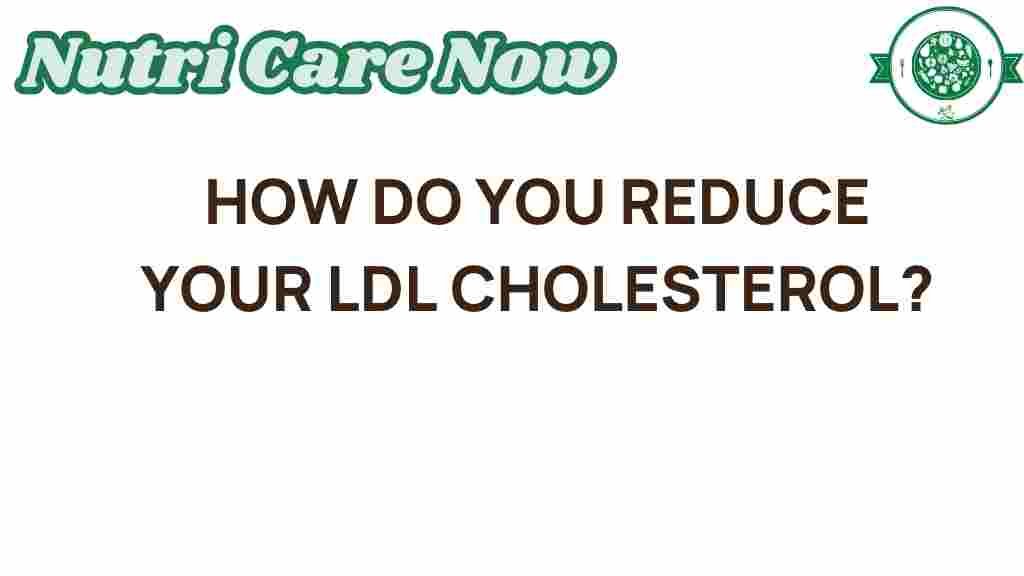Unlocking the Secrets: How to Effectively Reduce Your LDL Cholesterol
Maintaining heart health is crucial for overall well-being, and one of the key indicators of cardiovascular health is LDL cholesterol. Often referred to as “bad” cholesterol, high levels of LDL cholesterol can lead to atherosclerosis, heart disease, and other serious health issues. Fortunately, there are numerous strategies to effectively reduce your LDL cholesterol levels through diet, lifestyle changes, nutrition, supplements, and exercise. This article will guide you through the process of lowering LDL cholesterol and improving your heart health.
Understanding LDL Cholesterol
Before diving into the strategies for reducing LDL cholesterol, it’s important to understand what it is and why it matters.
- LDL Cholesterol: Low-Density Lipoprotein (LDL) cholesterol is a type of fat that transports cholesterol throughout your body. While your body needs cholesterol for essential functions, too much LDL cholesterol can accumulate in the walls of your arteries, leading to blockages.
- Heart Health: Maintaining healthy cholesterol levels is vital for heart health, as high levels of LDL cholesterol can increase your risk of heart attack and stroke.
Step-by-Step Process to Reduce LDL Cholesterol
Reducing your LDL cholesterol involves a combination of dietary changes, lifestyle modifications, nutritional choices, and exercise. Here’s a comprehensive guide to help you on your journey.
1. Adjust Your Diet
Your diet plays a critical role in managing LDL cholesterol levels. Here are some dietary changes you can make:
- Increase Soluble Fiber: Foods high in soluble fiber can help reduce LDL cholesterol. Consider adding:
- Oats
- Barley
- Beans
- Lentils
- Fruits like apples, pears, and citrus fruits
- Limit Saturated and Trans Fats: Reduce your intake of saturated fats found in red meat and full-fat dairy products, as well as trans fats found in many processed foods.
- Incorporate Healthy Fats: Focus on healthy fats such as those found in olive oil, avocados, and nuts. These can help improve your cholesterol profile.
- Eat More Plant-Based Foods: A diet rich in fruits, vegetables, whole grains, and legumes can significantly lower your LDL cholesterol.
- Consider Plant Sterols and Stanols: These substances found in certain fortified foods can help block the absorption of cholesterol.
2. Make Lifestyle Changes
Beyond diet, certain lifestyle changes can have a positive impact on your LDL cholesterol levels:
- Stop Smoking: If you smoke, quitting can improve your HDL (good cholesterol) levels, which can help offset LDL cholesterol.
- Limit Alcohol Intake: Drinking alcohol in moderation can be beneficial, but excessive consumption can lead to high cholesterol levels.
- Manage Stress: Chronic stress may contribute to unhealthy eating habits and increased blood pressure. Practice relaxation techniques such as yoga, meditation, or deep breathing.
3. Nutrition and Supplements
In addition to dietary changes, consider the following nutritional supplements:
- Omega-3 Fatty Acids: Found in fish oil or algae supplements, omega-3s can help lower triglycerides and improve heart health.
- Niacin: This B vitamin can help lower LDL cholesterol levels, but it should be taken under medical supervision.
- Plant Sterols and Stanols: Available as supplements, they may help reduce LDL cholesterol levels.
Always consult with a healthcare provider before starting any new supplements, especially if you have pre-existing health conditions or are on medication.
4. Exercise Regularly
Physical activity is crucial for overall cardiovascular health and can significantly impact your cholesterol levels. Aim for at least 150 minutes of moderate-intensity aerobic exercise per week. Consider the following activities:
- Walking
- Running
- Cycling
- Swimming
- Dancing
Incorporating strength training exercises at least two days a week can also be beneficial for overall fitness and cholesterol management.
5. Monitor Blood Pressure
High blood pressure can negatively affect your heart health and is often associated with high LDL cholesterol levels. Regularly monitor your blood pressure and take steps to keep it within a healthy range:
- Track Your Levels: Keep a log of your blood pressure readings to discuss with your healthcare provider.
- Limit Sodium Intake: Reducing salt can help manage blood pressure.
- Stay Hydrated: Proper hydration supports overall cardiovascular health.
Troubleshooting Tips
If you find it challenging to reduce your LDL cholesterol, consider these troubleshooting tips:
- Consult a Nutritionist: A registered dietitian can help you create a personalized meal plan that fits your lifestyle.
- Join a Support Group: Engaging with others who are on a similar journey can provide motivation and accountability.
- Track Your Progress: Use apps or journals to monitor your diet, exercise, and cholesterol levels. This can help identify patterns and areas for improvement.
Conclusion
Reducing your LDL cholesterol is crucial for heart health and overall well-being. By making conscious dietary choices, adopting healthier lifestyle habits, incorporating beneficial supplements, and committing to regular exercise, you can effectively lower your LDL cholesterol levels and improve your cardiovascular health. Remember, it’s essential to consult with healthcare professionals for personalized advice tailored to your specific needs.
For more information on heart health and cholesterol management, visit The American Heart Association. If you’re looking for community support, check out our resources on local health groups here.
Start your journey towards better heart health today by making these small but impactful changes in your life!
This article is in the category Health and created by NutriCareNow Team
